高职国际英语第三册课件Book3_unit 1
中职英语三册unit 1 lesson 3
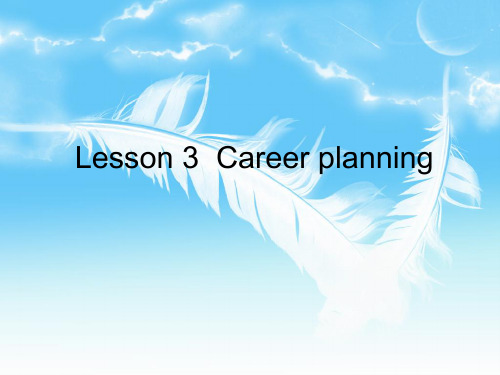
Lesson 3 Career planning
Task 3 Reading practice : read and fill in the chart with the career planning steps
The career planning process can be divided into six steps: 1. Self-assessment 2. Career Exploration 3. Targeting 4. Career Preparation 5. Marketing Yourself Career Management
Lesson 3 Career planning
Task 3 Reading practice : read and fill in the chart with the career planning steps
This process is always ongoing and often runs in cycles. When you need changes in your career, the process can be repeated many times. If you spend some time planning your career, you’ll be a lot happier with the job you get and probably make more money, too.
• • • • •
Lesson 3 Career planning
• 职业生涯规划五步曲:
Lesson 3 Career planning
Task 4 Post-reading activity: complete the sentences
中职英语第三册Unit3 What courses do you offer基础模块课件
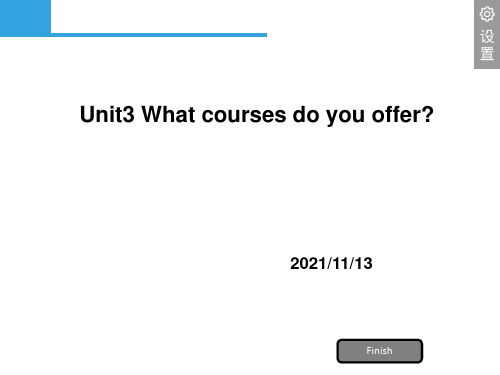
【】 【】 【】 【】 【】
提交
4 Listen and decide.听录音,勾出David想要选择的学习式。
提交
5 Listen and tick. 再听录音,完成以下学员信息表。
Name Course Subject Type of class Way to register
David
□ Adult
writing and technology skills! Wednesday 5:30PM—8PM
Call for details.
提交
10 Read and choose. 阅读培训项目广告,为下面的人选择适当的课程。
Technology Workshops Meet twice a week
提交
6 Listen, read, and underline.
听录音,用下画线标出询问信息的语句。
David: Do you offer full time course or part time course? Sally: We have day course, evening course and weekend
能介绍一下课程吗? 有⋯方面的课程吗?
请问学费是多少? 有什么要求吗?
提交
9 Discuss and answer. 与同伴讨论,回答下列问题。
1. What information is necessary for an advertisement of a training program?
The location of the training school; Courses they offer; Time of the training classes; Telephone number and the web address etc.
Unit 1课件-2021-2022学年中职英语(第三册)(山东省职业教育出版)拓展模块
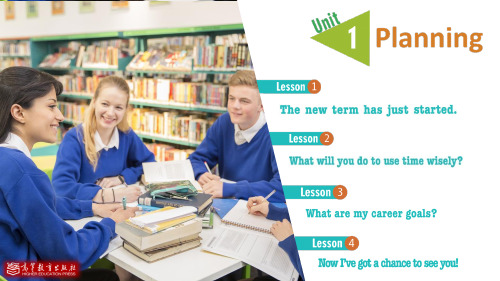
Unit 1
We are willing to adjust our schedule for the event. 我们愿意为这个活动调整我们的计 划。
She carefully adjusted her clothes and her hair before going out. 她出门之前仔细地整了整衣服和头 发。
Unit 1
Listening Speaking
□ Listen to English 10 minutes before going to bed. □ Listen to English 10 minutes after getting up. □ Listen to English 10 minutes after school.
4) — Do you often adjust your schedule? — Sometimes. / Often. / Never.
Unit 1
All of us around the world, no matter what time zone we live in, have 24 hours in each day. A daily schedule will help us plan every part of our day, from the moment we wake up in the morning to the moment we go to bed at night. We should be able to take control of how we spend our time from one hour to the next.
Unit 1
I will believe that when I see it. 我亲眼见到才能相信。 Believe me, smoking is harmful. 相信我,吸烟有害。
高职国际英语1 unit 1

Unit1People1.Warmingup:Usingthephrases“Howdoyoudo?MynameisNicetomeetyou.”writtenontheboard.2.Focus:Thestudentsareshownpicturesofpeoplemeetingforthefirsttime.Theyarealsosuppli edwithadialoguewhichtheycancopytosaywhattheydowhentheymeetsomebodyfor thefirsttime.Theyjointheirhandsatpalmsandsmile.Theyshakehandsandsmile. Theybowfromthewaistandlowertheireyes.Askstudentsto:1)Matchnationalitieswiththepictures:whichpictureshowsanIndianwoman?WhichpicturesshowstwoJapanesewomen?WhichpictureshowstwoAmericans?Whi chpicturesshowstwoChinesemen?2)Actoutoneofthesegreetingsinclass.Theotherstudentsmustguesshowtheyaregreetingeachother.Areyoubowingfromthewaistandloweringyoureyes?Areyous hakinghandsandsmiling?3)Tellhowtheygreeteachother?Howtheygreetolderpeople?Howtheygreettheirteachers?Howtheygreettheirparentsandotherrelatives?Andactingoutthesediff erentwaysforgreetingpeople.3.TextA:greetingandintroducingpeople1)Newwordsreading2)Askstudentswhattheycanseeinthepictures,howoldtheythinkthepeopleare,whatkindofoccasionitcouldbeandiftheyhaveabarbecueathomeandwhattheybarb ecue.3)Askstudentstoreadoutthetextloudparagraphbyparagraph.Collectanywordswhichstudentshavedifficultypronouncing.Writingthesewordsontheboard.Make alistontheboard.Thenrepeatthewords.4)Askstudentsthefollowingquestions:Howtogreetanolderpersonwhenyoumeethimforthefirsttime?Doyoushakehandswithanolderperson?Doyousmileatanolderperson?Howdoyouintroduceyourselftoanolderperson?Whatdoyousaytoayoungerperson?Howdoyouintroducesomebodyelsetoayoungerperson?Whatdoyousaytosomebodyyoualreadyknow?Howdoyouanswerayoungerpersonyouknowwhogreetsyoufirst?5)PairworkasKateMillerandSungLingstartingfromline17.6)Page5-1:readoutthesentencesandthenpairthem.7)Page5-2:checkthemeaningofthewordsbeforedoing.4.Backgroundinformation:1)studentexchange:increasestudent'sunderstandingandtoleranceofotherculture s,aswellasimprovingtheirlanguageskillsandbroadentheirsocialhorizon.2)Barbecue:anoutdoormeal,usuallyaformofsocialgatheringatwhichmeats,fish,orf owl,alongwithvegetables,areroastedoverawoodorcharcoalfire.5.wordsandexpressions:1)exchangepartner2)BowTheybowedlowtothechairman.Heturnedandbowedtohisboss.BowandarrowsHetookbowonstagetoaudience.3)Next-doorneighbor4)LimpLimphandshakeSheletherwholebodygolimp.Maryhadtwistedherankleandwaslimping.一瘸一拐5)Friend--friendlyunfriend--unfriendly--unfriendliness6)Informal--informally--informality7)Shortperiod8)Formal--formally--formality9)Hadbetterdo10)Informalformalnaturalpersonalprofessionaladditionaleducationalmusicalact ualofficialregionalindustrialinternationalmedicaltraditionalculturalpracticalPage7listening1:Beforeplayingtherecordinggetstudentstoreadthesentences1to6,firstquietlytothe mselves,thenaloud.Makesurethateverybodyhasunderstoodthesentences.Nowplaytherecordingandgetstudentstodotheexercise.Bepreparedtoplaytherecor dingasoftenasthestudentsneedit.Patrick:goodmorning.Excuseme,butareyouMsSusanGarnerfromChicago,pleaseSusan:that'sright.Patrick:howdoyoudo,MsGarner?I'mPatrichChoy.It'snicetomeetyou.I'vecometota keyoutoyourhotel.Susan:howdoyoudo,MrChoy.It'snicetomeetyou,too.Look,mayiintroduceyoutoone ofmycolleagues?ThisistonyHunter.Tony,thisisPatrickChoy.He'scometotakeustoo urhotel.Tony:Fine.Howdoyoudo,MrChoy?It'sapleasuretomeetyou.Patrick:Howdoyoudo,MrHunter.WelcometoHongkong.Tony:Thankyou.I'veheardsomanygoodthingsaboutHongkongthatit'swonderfulto behere.Patrick:that'snicetohear.Now,couldyoucomethisway,please?Thecar'sjustoutsidet hebuilding.It'snotfar.Askstudentstoreadoutthesentencesandsaywhethertheyaretrueorfalse.TextB:BlindDate1.Backgroundinformation:1)Blinddate:itusuallyoccurswhenthetwopeoplepreviouslynotknowingeachotheraregoingoutonadatesetupbyanotherpersonwhoknowsbothpeople.Today,m ostblinddatesaren'ttotallyblindperse,thankstoonlinesocialsitessuchasFacebo okandMySpace,wheremanypeoplehavephotographsofthemselvesthatareea silyaccessiblebyothers.2)Geocaching地理寻宝游戏:isahightechversionofhideandseekandanoutdoorrecreationalactivity,inwh ichtheparticipantsexploretheoutdoorsinsearchofhidden“treasure”andadven turebyusingaGPSreceiverormobiledeviceandothernavigationaltechniques.2.Wordsandexpressions:1)Internetdatingsite2)Icouldnotbelievemyeyes.3)ShebeganmodellinginParisaged15.4)Glamour--glamorous5)Suit--suitable6)Allthegirlsfanciedhim.Lindatookquiteafancytohim.Whatdoyoufancydoing?Ijustfanciedadrink.7)tongue-tied8)Agenerousglassofwine一大杯酒;generosity大量充足9)Tipthewaiteradollar10)Stripedtie条纹领带11)TieupyourshoelaceItiedaknotintherope.12)ican'tstand.13)Ignore--ignorant--ignorance14)Beinnomoodfor.../todo...没心情做某事Beinthemoodfor../todo...有心情做某事Beinamood情绪不好15)misery--miserable--miserably16)Regret--regrettable--regrettably17)Straightaway马上18)Hopefully但愿19)Strikeupaconversationwithsb.搭讪攀谈strick--struck20)Beinconversationwithsb.正在谈话21)Makeconversation搭话找话说说应酬话。
高教版职高英语3(基础模块)Unit_1课件

Read and answer.
1.
What made Mr Hall want to hold a Christmas party on the ice? The sight of the ice on the river made Mr Hall want to hold a party on the ice. __________________________________________________________________
Act and practice.
Christmas Halloween Thanksgiving New Year
A: Hi, … Are you free …? We are planning to … party ... Would you like to join us?
B: A … party? It sounds interesting but I prefer to ...
Lynn: A Halloween party? It sounds interesting but I prefer to stay at home.
Jack: Why? You will have a lot of fun if you join us. Lynn: Maybe you are right, but I had no fun at my last Halloween party. It was terrible. Jack: What happened? Lynn: You can imagine how I felt when I saw that everyone had dressed up except me.
Party Information Card
中职英语unit 3 internship 课件

中职英语unit 3 internship 课件Unit 3 Internship1. Objectives- Understand the concept of internship- Learn the benefits of doing an internship- Develop skills necessary for a successful internship- Understand the importance of networking during internship2. IntroductionInternship is a valuable work experience for students to gain exposure to real-world scenarios and enhance their skills. It is a temporary position in an organization where students work alongside professionals to gain practical knowledge and experience in their field of study.3. Benefits of doing an internship- Gain practical experience: Internships provide hands-on experience that cannot be gained in the classroom.- Develop skills: Internships help students develop soft skills such as communication, teamwork, and problem-solving skills.- Build a network: Internships allow students to build a network of contacts that can help them in their future careers.- Increase employability: Internships enhance students’ resumes and make them more attractive to potential employers.4. Skills needed for a successful internship- Communication skills: Interns need to effectively communicate with colleagues, supervisors, and clients.- Time management: Interns need to manage their time effectively to meet deadlines and complete tasks efficiently.- Problem-solving skills: Interns need to be able to think critically and solve problems that may arise during their internship.- Adaptability: Interns need to be flexible and adapt to new challenges and situations.5. Importance of networking during internship- Networking is crucial for career advancement as it helps students build professional relationships and connections.- Networking can lead to future job opportunities as employers are more likely to hire someone they know or someone recommended by a trusted contact.- Networking can provide valuable mentorship and guidance from experienced professionals in the field.In conclusion, internships are a valuable opportunity for students to gain practical experience, develop skills, build a network, and increase their employability. It is important for students to make the most of their internship by developing the necessary skills and networking with professionals in the field. By doing so, students can set themselves up for success in their future careers.。
高职英语3 unit_one
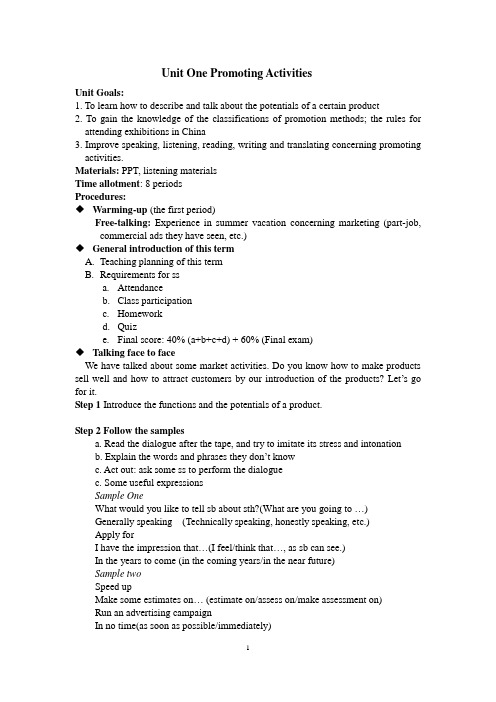
Unit One Promoting ActivitiesUnit Goals:1. To learn how to describe and talk about the potentials of a certain product2. To gain the knowledge of the classifications of promotion methods; the rules for attending exhibitions in China3. Improve speaking, listening, reading, writing and translating concerning promoting activities.Materials: PPT, listening materialsTime allotment: 8 periodsProcedures:◆Warming-up (the first period)Free-talking: Experience in summer vacation concerning marketing (part-job, commercial ads they have seen, etc.)◆General introduction of this termA.Teaching planning of this termB.Requirements for ssa.Attendanceb.Class participationc.Homeworkd.Quize.Final score: 40% (a+b+c+d) + 60% (Final exam)◆Talking face to faceWe have talked about some market activities. Do you know how to make products sell well and how to attract customers by our introduction of the products? Let’s go for it.Step 1 Introduce the functions and the potentials of a product.Step 2 Follow the samplesa. Read the dialogue after the tape, and try to imitate its stress and intonationb. Explain the words and phrases they don’t knowc. Act out: ask some ss to perform the dialoguec. Some useful expressionsSample OneWhat would you like to tell sb about sth?(What are you going to …)Generally speaking (Technically speaking, honestly speaking, etc.)Apply forI have the impression that…(I feel/think that…, as sb can see.)In the years to come (in the coming years/in the near future)Sample twoSpeed upMake some estimates on… (estimate on/assess on/make assessment on)Run an advertising campaignIn no time(as soon as possible/immediately)Step 3 Act outa. Role-playInvite ss to act out the dialogues and try to memorize some useful words and expressions.b. Task performanceThere are four tasks altogether, you can choose any one of them to perform with your partner. And you can make some reference from your textbook and workbook.Step 4 Put in useComplete the dialogues together and finally check the answer.◆Being all ears (listening practice)A.Listen and judgeB.listen and respondC.Listen and completeD.Listen and decideE.Listen and read◆Maintaining a sharp eyePassage one Promotion MethodsStep 1 Pre-reading1)Divide the ss into groups2)Show ss some products pictures or photos, and then ask them to create somemethods to promote them.3)Choose one student as from each group as the representative to present theirideas.4)Make a list on a PPT of the promotion methods commonly used by differentgroups.5)Have the groups discuss why they used the promotion methods listed, andthen invite some ss to report.Step 2 While-reading1)Have ss read through Passage 1. While your reading, underline the words andexpressions you can’t understand.2)Finish Exercise 1 in “Read and Think”. Check the answers.3)Skim again and ask them to list out the main types of promotion methodsmentioned in this passage.4)Ask ss to discuss and classify the promoting methods used in Activity 1 intothe three types (personal selling, mass selling, and sales promotion).5)Presenting the classifications by summing up the ss’ reports.6)Detailed studyStep 3 Post-reading1)Summarize how to do promotion2)Do the exercises and check itRead and completeRead and translateRead and simulate3)vocabulary buildingPresent the following words: distribute adapt stimulate spark deserveflexible scattered potential convince Present the definition of the words above, ask ss to match the words with thedefinitions (definitions are on PPT)4)Listen to Passage 1 again, pair the ss and ask them to discuss and fill in thefollowing table. Collect their opinions and disduss.5)1. Show the ss photos of a Haier washing machine, a bottle of Coca-Cola, a pair ofNike sportswear.2. Divide them into 4 groups. Ask them to design a market strategy for anyproducts listed above by using different promotion methods: personal selling,advertising, publicity and sales promotion.3. Ask representatives to make presentation and give comments.6)Collecting and researching (this can be their after-class assignment)①Have ss work together to list the top ten brand names the ss are familiarwith.②Make a list of the top ten brand names.③Group ss and have them discuss the promotion methods the ten brandnames that they are using. Brief comments on the promotion methodsare welcome.④Organize presentation to check their classifications.⑤Home assignment: Assign the ss to choose any brand name they arefamiliar with and analyze its promotion methods.Text-related informationa. Point of Purchase(POP)A terminal or vending machine in a store or shopping mall where a customer can view products with their prices and select items to buy. The term Point of Purchase usually refers to the industry concerned with customer behavior at the location of the purchase decision. POP is considered one of the most important aspects of advertising and merchandising. It is believed that the most critical time to influence buyer behavior is when they have money in hand.b. ColecoColeco(1932-1989) was a company founded in 1932 by Maurice Greenberg as “Connecticut Leather Company”. It became a highly successful toy company in the1980s, known for its mass produced version of Cabbage Patch Kids.c. Marketing mixThe marketing mix is generally accepted as the use and specification of the 6Ps describing the strategic position of a product in the marketplace.1. Plan your marketing strategy.2. Pick a way to market.3. Price it right.4. Package it professionally.5. Promote your product/service6. Prove that it works. If not, make it better or go back to 1.AdvertisingThe best approach to advertising is to think of it in terms of media and which media will be most effective in reaching your target market. Then you can make decisions about how much of your annual advertising budget you’re going to spend on each medium. The most frequently-used advertising methods are as follows: The Internet television radio newspapers magazine telephone books/directories billboards bench/bus/subway ads direct mailSome important words:①spark v. to make someone feel interested, hopeful, etc.eg: What he said sparks our curiosity.These books mainly deal with topics that spark children’s imaginations.② 2. deserve v. to have earned something by good or bad actions or behavior应该得到eg: People who are sent to prison for drunk-driving get what theydeserve.Paula deserves a special mention for all the help she has given us.③ 3. Distribute v.t o share things among a group of people,especially in aplanned way; to exist in defferent parts of an area or group 分配了;散步eg: Clothes and blankets have been distributed among the refugees.The populations is distributed in a very uneven pattern.④ 4.adopt v.to take someone else’s child into your home and gefally become itsparent; to start to deal with or think about something in a particular way 收养;采用;接受eg: Having no children of their own, they decided to adopt an orphan.The courts were asked to adopt a more flexible approach to young offenders.⑤ 5. adapt v. to gradually change in order to be successful in a new situation使适应;改编eg: How do these insects adapt themselves to new environments?The ability to adapt is a definite asset in this job.⑥ 6. stimulate v. to excite to activity or growth or to greater activity 刺激;激励eg: The exhibition stimulated interest in the artist’s work.Praise always stimulates him to further efforts/to make greater efforts. Difficult sentences:①Marketing mixes: refers to the use and specification of the 6s describing thestrategic position of a product in the marketplace.e.g. Creating a successful marketing mix that will increase results often takesexperimenting and market research.②offerings: refers to “the products manufactured by the company or the servicesprovided by it”. Without is a prep., and that’s why “having” is used to followit.e.g.A cool technique for stopping this problem is simply to plan withoutcommitting yourself to doing anything.③featurin g ,serves as “which featurs”, means “showing a particular thng in amagazine”. In part means “partly”. Regular means “happening or doingsomething many times and often at the same time”.e.g. Those days, she wsa deeply invoved into that exhibition featuringpaintings by contemporary artists.④subjunctive sentencee.g. The committee made a number of recommendation that safety standardsbe improved as soon as possible.⑤other than: apart from a particular person or thing. By: is used to show theperson or thing that does something or makes something happen.e.g. How can you say that religion is anything other than a way of controllingpeople.Passage two rules for attending exhibitions in ChinaObjectives: 1. Reviewing passage 12. Recognize the rules for attending exhibitions in China3. Some key words and expressions4. Continue to improve the FIVE skills(listening, speaking, reading,writing and translating) concerning the unit theme.Step 1 Check homeworkCheck and discuss their homework assigned last period. The following questions may be used:a. What brand name did you choose?b. Why did you say it is effective?c. What did type of it?d. What promotion methods did the brand name use in recent years?e. Were there any changes, what were they and why?f. What are the results of their changes?Call them to pay attention to the changes of the methods used for promoting the product. Make comments.Step 2 Warm-up BrainstormingLet ss think of their experiences and knowledge about exhibitions. Questions:a. Have you ever attended any exhibitions?b. What is exhibition?c. What is the purpose of exhibition?d. Can you name some famous exhibitions here in China?e. Generally, what situation should be avoided while attending an exhibition?f. Are there some rules to follow? What are they?Step 3 Reading for detailsHave ss listen to Passage 2 and underline the ten rules for attending exhibitions in China. And then give necessary information related to the text as well asexplanation of the important words.Text-related informationHere is a brief introduction to three important fairs held in China:Chinese Export Commodities Fair; China Hi-Tech Fair; Air Show, China Important words①promote v. attempt to sell; raise to a more important job 促销;提拔;提升e.g. Many companies are promoting their new products on televisionThe young army officer was promoted to Captain last month.②efficient a. acting effectively, without wasting time and energy 高效的;能干的e.g. The company is in urgent need of an efficient secretary.This new laser printer is more efficient secretary.③focus v. concentrate attention or energy 注视;聚焦;集中e.g. Students are supposed to focus their mind on study.When the movie star walked into the hall, all eyes were focused on her.④man v. to work at a place or be in charge of a place or a machine 工作(或守卫)在、、、岗位上,在、、、上操作,操纵e.g.Tom will be the person to man the machine till 2:00 pm.They have sent more soldiers to man the front.⑤leave v. carse to be or remain in a specified state; go away 使保持某一种特定状态;离去e.g. Never leave the door open while sleeping at night.After a hot quarrel, Maria left her husband.⑥fruitful a. productive 富有成效的;多产的;硕果累累的e.g. Charles Dichens is considered (to be or as ) a fruitful author of fiction.To her joy, Jane found the meeting very fruitful.Difficult sentences①Unless your company is sponsoring…, find out… after that.Analysis: Here unless is a conjunction, meaning “if … not …; except in the case that.”Unless is used to talk about a situation that could happen, or sth.That could be true, in the future. If you know that sth has not happened or that sth is not true, use if …not …And before find out, “you should”is omitted. After that means after the opening ceremony.②The opening ceremony … the exhibition halls.Analysis: Starting gun means “the gun that starts a game or race at a sportsmeeting”. The gathered crowds indicates “people who gathered outside oraround the exhibition halls”. To get inside the exhibition halls is an infinitivephrase used as an adverbial of purpose.③Hot cars and pretty girls … be distracted by them.Analysis: Hot cars: fashionable and popular cars . Both cars and girls areused to draw visitor’s attention. Go well:be a perfect match or be goodcombination. Distract:take …away from …or cause …to turn awayfrom …④Lunch hour … promoting the company.Analysis: Here who is a pronoun that introduces a relative clause, modifyingguys. In is omitted before explaining and promoting.⑤Guards are available to assist … to keep order.Analysis: Here who is omitted after the word anyone, forming a relativeclause with in need of help and modifying anyone. Be in need of is a setphrase, meaning “need”⑥This is the place … are interested in using.Analysis: To find out : to make …clear. Which is used as a pronoun that introduces an objective clause. Connected Chinese refers to those who have gained the access to the Internet.Step 4 ExercisesRead and judgeRead and rewriteRead and translateTrying your handObjectives:1. Reading and Writing: Products Advertisements2. Practicing writing skill: Picture DescriptionStep 1 Read and simulate (critical reading)a.Read the two samples of product prospectuses carefully and learn to writeyour own.b.Chinese equivalents will be given if necessaryc.Pay attention to the format and the similar content shared by the two samples. Step 2 Simulate and createanize class work on the basic elements of product prospectuses; andmake a list basic element on PPT or blackboard.plete the table and fill in the blanks; check students’ answers and keyswill be given.c.TranslateStep 3 General writinga.Write through correcting mistakesb.Write through translationc.Write through describing a pictureHomework1.Write a product prospectus for one of the products in Talking Face to Face2. Review the important expressions and words and keep them by heart.。
(新)高职国际英语book1Unit3
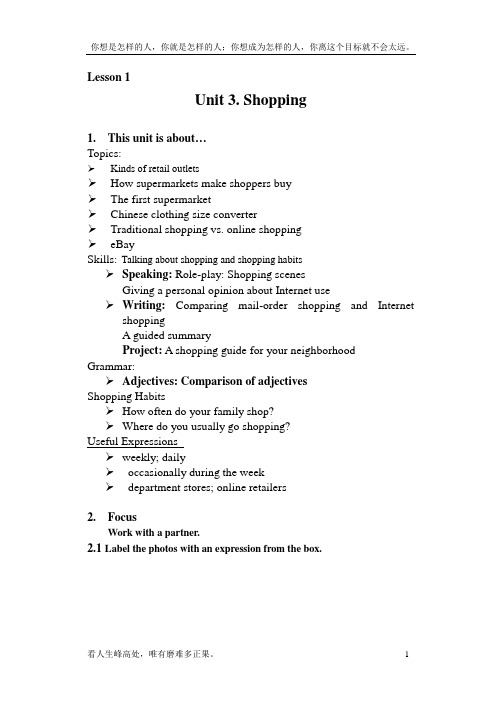
Lesson 1Unit 3. Shopping1. This unit is about…Topics:➢Kinds of retail outlets➢How supermarkets make shoppers buy➢The first supermarket➢Chinese clothing size converter➢Traditional shopping vs. online shopping➢eBaySkills:Talking about shopping and shopping habits➢Speaking: Role-play: Shopping scenesGiving a personal opinion about Internet use➢Writing:Comparing mail-order shopping and Internet shoppingA guided summaryProject: A shopping guide for your neighborhood Grammar:➢Adjectives: Comparison of adjectivesShopping Habits➢How often do your family shop?➢Where do you usually go shopping?Useful Expressions➢weekly; daily➢occasionally during the week➢department stores; online retailers2. FocusWork with a partner.2.1 Label the photos with an expression from the box.1. supermarket2. market3. corner shop4.street vendor5. specialist store6. online retailer(chemist’s)7. department store 8. chain store 9. shopping mall➢chain store corner shop department store➢market online retailer shopping mall➢specialist store (chemist’s) street vendor s upermarket2.2 Where do you do your shopping?2.3Talk about your shopping habits.Useful Expressions➢I often/sometimes/never do my shopping/shop at a/an department store/ …➢My partner/He/She/(sb.’ name) does his/her shopping/ … at a/an …3. Text Study (Passage A)3.1 Background Informationonline shopping✧online retailing, the act of purchasing products or services overthe InternetKey words:physical storesonline storesconvenientbargainholiday seasonwait in long linesconsumerism✧ a belief that encourages the purchase of goods and services inever-greater amounts✧Key words:✧consumerist✧movement✧ a set of policies✧regulate✧standard✧manufacturers✧in the interests ofimpulse purchase✧impulse buying, an unplanned decision to buy a product orservice, made just before a purchase✧Key words:✧impulse purchaser✧impulse buyer✧financial difficulty✧family disapproval✧feeling of guilt✧disappointment✧3.2 Words and Expressionsexpert n. 专家trolley n. 手推车purchase n.购置物shopping list 购物单pepper n.辣椒sorted adj.properly arranged or planned 分选的pre-packed adj. already packed 预先包装的special offer bargain 特价商品packet n.小包,小袋bakery n.面包烘房roll n.小圆面包display n.展列canned adj.罐装的bottled adj.瓶装的frozen adj.冷冻的goods n.货品delicatessen n.熟食店freshness n.新鲜食品electrical adj.电气的product n.商品essential n.必需品butter n.黄油impulse item 一时冲动购买的商品profit n.利润brand name 品牌processed food 加工食品pre-cooked meal 半成品食品profitable adj. money-making 盈利的at eye level 齐眼的高度checkout n.收银台leaflet n.传单loan n.贷款insurance n.保险mobile phone 移动电话credit card 信用卡3.3 Text译文被动消费步入大型超市时,千万不能大意!那帮精明狡诈的人已经看到了你的到来。
高职国际英语

Warming up
Make a list of everything you can see in town.
buildings
traffic
things in the street
Book 1
Unit 2 - Places
Warming up
Make a list of everything you can see in town.
Go straight on over the roundabout. Look out for domestic animals. No cycling on this road. The road ends here, so be careful. Warning! Road works ahead so there might be traffic delays.
i.
j. k.
Traffic lights ahead.
You must go right at the turn-right sign. You must not enter this road.
Book 1 Focus
Unit 2 - Places
Link the sentences to the signs:
first • second • third • fourth • fifth sixth •seventh • eighth• ninth • tenth • eleventh
first The second third sign
says
go straight on over the roundabout.
Go straight on over the roundabout. Look out for domestic animals. No cycling on this road. The road ends here, so be careful. Warning! Road works ahead so there might be traffic delays.
高职国际英语第三册课件Book3_unit 1

Book 3
Book Rally
Skim through the book and find the answers to these questions. 1. After the project was called “Project Snowstorm”, what was its
role of a project manager • why deadlines are so important
Book 3 Unit 1 - Projects
Brief summary of the unit
Skills
➢ Speaking: • Role-playing: having a debate
Background information Words and expressions Text
Looking at the text Working with words Listening
Listening 4 Listening 5
Speaking
Book 3 Unit 1 - Projects
name changed to? Its name was changed to “Project Avalanche”. (Unit 1, page 11) 2. What kinds of trade fairs can you see in the photos? One is a trade fair for IT service and the other for computer games. (Unit 4, page 62) 3. Name the countries that you can read on the barcode labels. The countries are India, USA, China, Mexico. (Unit 8, page 144)
高级职业英语第三册 第一单元 听说课件-unit1-conducting a survey
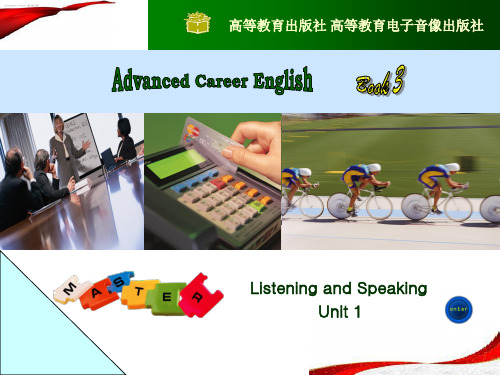
back
Activity 1 Task check-ups
Task 1 Listen and Write
Script:
1. telephone survey 2. market share 3. consumer response 4. sample 5. be popular with 6. It is absolutely necessary to conduct a market survey for a new business. 7. We have sent questionnaires to the customers.
Section 1 Activity Three speak out
Task 2: Prepare a short speech to be presented in class by filling in the blanks with the information from the table above.
survey analyze qualitatively sample research method
questionaire quantitatively outcome determine collect data
back
Section 1 Activity Two
Listen and Repeat 1. It is absolutely necessary to conduct a market survey for a new business. 2. What’s your purpose of the market research? 3. One of the purposes of market research is to find out whether there’s a market for the product or service. 4. We have sent questionnaires to customers. 5. What’s your market share? We have about 7 percent of the Chinese shoes market. 6. According to our market research information, customers are particularly interested in the qualities and prices of the products.
高职国际进阶英语 Unit 1 People 课件

Unit 1 People
Place. Hometown
Focus
I come from ____,the capital of_____province. ______is my hometown. It is a beatutiful small city, and I love it very much. People in my hometown are nice and warm-hearted. I was born in _______. When I was 8 years old, my parents and I moved to______. Welcome to my hometown!
Progressive English for Vocational Colleges Book 1
Unit 1 People
Self Introduction
Good morning dear friends, how are you today? Please allow me to introduce myself. My name is Andy. I‘m 18 years old. I’m energetic and generous. I graduated from No.1 Occupation Technical Secondary School, Kunming. Now I‘m a freshman in Shanghai Institute of Technology. In my spare time, I like playing the piano and dancing. By the way, I like light music as well, it makes me relaxed. To travel around the world is my goal, that’s the reason why I choose cruise service as my major. That‘s all. Thank you!
高教版英语1(高职高专版)(第三版)课件unit 3
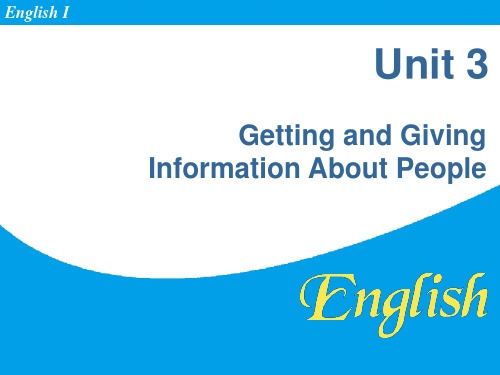
(Listening and Speaking
熟读对话与课文,背诵对话和课文语句,并能就课文内容进行问答。
Reading and Translating
能朗读并翻译(英译汉)有关介绍,涉及年龄、地址、职业、国籍等的 小短文。
Lizzy: How many members are there in your family?
Li: There are five in my family. Look at the picture. The old couple in the middle are my parents. They used to be doctors and now both of them are retired. The young man on the left is my elder brother. He is the manager of a big company in the South.
6) A passport provides the personal particulars about the holder such as (name, age, sex, nationality and so on).
7) That’s why (he has the passport).
Unit 3 Getting and Giving Information About People
Applied Writing Grammar Focus Merry Learning Words & Phrases
• Lead-in • Dialogues • Passage A • Learn to communicate • Build up your language stock • Extra reading • Passage B
高职国际英语课本电子版
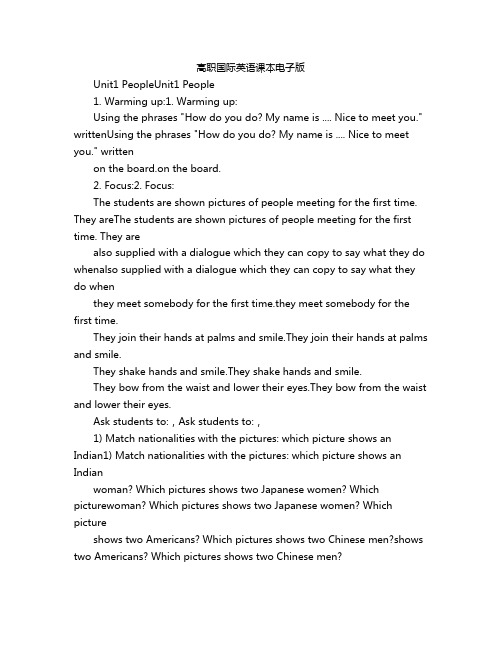
高职国际英语课本电子版Unit1 PeopleUnit1 People1. Warming up:1. Warming up:Using the phrases "How do you do? My name is .... Nice to meet you." writtenUsing the phrases "How do you do? My name is .... Nice to meet you." writtenon the board.on the board.2. Focus:2. Focus:The students are shown pictures of people meeting for the first time. They areThe students are shown pictures of people meeting for the first time. They arealso supplied with a dialogue which they can copy to say what they do whenalso supplied with a dialogue which they can copy to say what they do whenthey meet somebody for the first time.they meet somebody for the first time.They join their hands at palms and smile.They join their hands at palms and smile.They shake hands and smile.They shake hands and smile.They bow from the waist and lower their eyes.They bow from the waist and lower their eyes.Ask students to:,Ask students to:,1) Match nationalities with the pictures: which picture shows an Indian1) Match nationalities with the pictures: which picture shows an Indianwoman? Which pictures shows two Japanese women? Which picturewoman? Which pictures shows two Japanese women? Which pictureshows two Americans? Which pictures shows two Chinese men?shows two Americans? Which pictures shows two Chinese men?2) Act out one of these greetings in class. The other students must guess how2) Act out one of these greetings in class. The other students must guess howthey are greeting each other. Are you bowing from the waist and loweringthey are greeting each other. Are you bowing from the waist and loweringyour eyes? Are you shaking hands and smiling?your eyes? Are you shaking hands and smiling?3) Tell how they greet each other? How they greet older people? How they3) Tell how they greet each other? How they greet older people? How theygreet their teachers? How they greet their parents and other relatives? Andgreet their teachers? How they greet their parents and other relatives? Andacting out these different ways for greeting people.acting out these different ways for greeting people.。
中职英语第三册Unit1 Planning Lesson1 New terms, new plans

I'd like to... I hope to...
take part in more sporting events.
work in Haier.
I wish to...
study abroad.
I want to...
get an ideal job.
take part in more sporting events.
eg. A: The new term has just started. What's your plan in the new term?
B: I'd like to take part in more sporting events.
Task4 Listening practice
新学期开始了,同学们在开学班会上踊跃发言。
4. There were not enough tables in the dining room. Students rushed to the few ______ ones.
dining room 餐厅 rush to 冲向
Task3 Pre-listening activity: read and match 运用方框中提供的信息组成表达愿望的句子。
believe
v. to feel certain something is ture 相信
eg. 1. I can't believe a new term has started. 我不能相信新的学期已经开始了。
2. Believe me, she's not right for you. 相信我,她不适合你。
year
学期
eg. 1. The new term has just started. 新学期刚刚开始。 has/ have done 完成时
高职国际英语第三册课件Book3_unit 1word版本

Book 3
20. What colour is the iPod in the photo? It’s blue. (Unit 5, page 81)
21. In which country are Kinder Surprise Eggs banned? In America. (Unit 2, page 30)
18. What are the names of the three delivery companies mentioned? UPS, FedEx and DHL. (Unit 6, page 114)
19. Where is the Polynesian Village resort? It is at Walt Disney World. (Unit 7, page 130)
13. Give three examples to show that you agree on a point. I agree with you on that point. / That’s a fair suggestion. / So what you’re saying is that ... / In other words, you feel that ... / You have a strong point there. / I think we can both agree that ... / I don’t see any problem with/harm in that. (Unit 1, page 10)
Book 3
16. Who is Julia Kitale? She is an office worker in Kilimanjaro Textile Company, Nairobi, Kenya. (Unit 8, page 146)
大学英语教程Book3Unit1课件

n. 不幸
ill luck; bad fortune
❖ specter
n. 幽灵
a phantom; ghost ❖ prosperous
a. 兴旺的
flourishing
Key Expressions in Use
❖ in harmony with in accordance with
❖ delight one’s eye be eye-catching
Always, Rachel, the writer was much refuted when the book first came out. The Time Magazine ridiculed her as talking nonsense and the Reader’s Digest withdrew the offer to print a selection from Silent Spring.
❖ wither
v. 凋谢
to dry up from loss of moisture
❖ creep
v. 潜行
to move cautiously or stealthily
❖ migrant
n. 移居的人或动物
one that moves from one region to another
❖ misfortune
Unit one
A fable for
tomorrow
Cultural Notes
❖ The origin of the article
This fable was taken from Carson’s prophetic book: Silent Spring (1962), which was an expose of the longterm effects of pesticides upon our environment. She argued that we had entered the age of chemicals willynilly( 不管愿不愿意)without considering the totality of nature. Processes within nature were working to undo the very things we hoped to achieve using pesticides, thereby causing large-scale imbalances. To be precise, she urged us to better understand nature and to use its processes to our advantage without the use of pesticides.
中等职业学校英语第三册

Teaching method
Picture
Case studies
In depth discussions on key concepts and topics
Students analyze real world scenarios to apply course concepts
Group work
International Business: Examines global business
practices and cross cultural communication
Project Management: Focuses on project
planning, execution, and evaluation
Vocational School English Volume 3
• Course Introduction • Teaching content • Textbook analysis • Teaching Cases • Teaching Reflection and Improvement
Phonetic training
Emphasize the training of students' pronunciation, intonation, and speaking speed to improve their accuracy and fluency in speaking.
Writing Practice
03
Textbook analysis
Textbook structure
01
Chapter arrangement
This textbook is divided into 10 chapters, each focusing on a specific theme, such as "Professional Communication" and "Business English".
- 1、下载文档前请自行甄别文档内容的完整性,平台不提供额外的编辑、内容补充、找答案等附加服务。
- 2、"仅部分预览"的文档,不可在线预览部分如存在完整性等问题,可反馈申请退款(可完整预览的文档不适用该条件!)。
- 3、如文档侵犯您的权益,请联系客服反馈,我们会尽快为您处理(人工客服工作时间:9:00-18:30)。
15. Where is the GamesCom trade fair held? It is held in Cologne, Germany. (Unit 4, page 69)
Book 3
4. Where does the little girl in the cartoon want to outsource her homework? She wants to outsource it to India. (Unit 8, page 148)
5. Where do the Ice Road Truckers drive? In the north of Canada. (Unit 6, page 110)
Book 3
20. What colour is the iPod in the photo? It’s blue. (Unit 5, page 81)
21. In which country are Kinder Surprise Eggs banned? In America. (Unit 2, page 30)
Skills
➢ Listening: Listening to ... • two people talking about
project problems • two people discussing different
phases of a project • two people talking about the
The next stage of the job
Different ideas
Book 3 Unit 1 - Projects Focus
Communication problems The next stage of the job
Different ideas Money problems
Meeting the deadline On strike
role of a project manager • why deadlines are so important
Book 3 Unit 1 - Projects
Brief summary of the unit
Skills
➢ Speaking: • Role-playing: having a debate
6. Who is a small producer of computer flash drives? That is Phil Gereluk from Edmonton, Canada. (Unit 5, page 89)
7. At the board meeting in Unit 1, page 15, what is the first point on the agenda? The first point is the Burma project. (Unit 1, page 15)
Looking at the text Working with words Listening
Listening 1 Listening 2 Listening 3
Speaking
Book 3 Unit 1 - Projects
Personal view – Text (B) Text study
Book 3
8. How old is Megan Martin? She is 14 years old. (Unit 2, page 24)
9. Who is Petra Potts? She is a trade-fair organiser. (Unit 2, page 34)
10. What is the name of the hotel where Sabine Cameron works as a receptionist? The name of the hotel is Jameson Inn. (Unit 3, page 47)
Book 3
16. Who is Julia Kitale? She is an office worker in Kilimanjaro Textile Company, Nairobi, Kenya. (Unit 8, page 146)
17. Peter is having problems with his order. What did he order? He ordered a table and six chairs. (Unit 7, page 127)
18. What are the names of the three delivery companies mentioned? UPS, FedEx and DHL. (Unit 6, page 114)
19. Where is the Polynesian Village resort? It is at Walt Disney World. (Unit 7, page 130)
13. Give three examples to show that you agree on a point. I agree with you on that point. / That’s a fair suggestion. / So what you’re saying is that ... / In other words, you feel that ... / You have a strong point there. / I think we can both agree that ... / I don’t see any problem with/harm in that. (Unit 1, page 10)
Book 3 Unit 1 - Projects
– Text (A) – Text (B)
Book 3 Unit 1 - Projects
People and issues – Text (A) Text study
Background information Words and expressions Text
Book 3 Unit 1 - Projects Focus
Communication problems The next stage of the job
Different ideas Money problems
Meeting the deadline On strike
Meeti information Words and expressions Text
Looking at the text Working with words Listening
Listening 4 Listening 5
Speaking
Book 3 Unit 1 - Projects
➢ Writing: Writing an agenda
with the boss who has asked you ➢ Project: to watch the workers and report Writing an agenda for an
back to him on the time they imaginary dormitory meeting
spend on tea breaks etc.
dealing with problems which
• Being able to agree or disagree have arisen there
with a person • Reading a dialogue fluently • Personalizing a board meeting
Grammar
➢ Infinitive and gerund (1)
Book 3 Unit 1 - Projects Warming up
Project — New School
Make a list of anything you think could be connected with the words above.
11. Where did the 1998 Winter Olympic Games take place? They took place in Japan. (Unit 3, page 50)
Book 3
12. Who talks about the new Berlin airport project? Bob. (Unit 1, page 4)
Brief summary of the unit
Topics
➢ Projects and project managers ➢ The problems that can arise
during a project ➢ How to deal with problems ➢ Different phases of a project ➢ People involved in a project
Communication problems
On strike
Money problems
Book 3 Unit 1 - Projects
Text study (A)
Background information Words and expressions Text
project manager
A project manager is the person responsible for leading a project from beginning to end. This includes planning, execution and managing the people, resources and scope of the project. The project manager should create clear and attainable objectives and see them through to successful completion. The project manager has full responsibility and authority to complete the assigned project. The project manager’s position may end with the completion of the assigned project, or it may be a semi-permanent position for a limited time or until a predetermined point in the project’s schedule or stage of completion.
